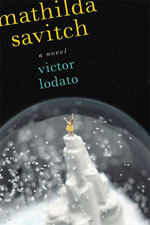Mathilda Savitch: A Novel, by Victor Lodato. FSG, $24
The tone of Mathilda Savitch announces itself from the start—the title reminiscent of Roald Dahl’s classic novel, the lilting pun on the word savage. The girl in question is young, although exactly how young, the reader never discovers. She is in school. She has two parents, both failed artists; she lives in a small town, in a small house with “window eyes, a window nose, and a door for a mouth.” Her life follows the familiar and furrowed contours of suburban adolescence. And yet as Mathilda announces, not twenty pages into the book, “I have my own beliefs, self-invented.” She yanks stray hairs from the soft flesh on the top of her head and stores the hairs away in a jar. She pinches the family dog. She breaks dishes to spite her mother; she tortures insects. “It’s not the innocence of yesteryear, that’s for sure,” she says. “Awful is easy if you make it your one and only.”
Remarkably, this is Lodato’s debut novel—he is a successful poet and a playwright—and much of the early praise for the book has centered on the sheer acuity of the prose. It’s true: Mathilda never flags. We cannot escape her voice, which has a trace of Holden Caulfield’s wariness and the magical faculty of the best Daniel Handler inventions. She sees the world like a child; she explains herself like a French philosopher in the throes of an existential crisis. “Every second that goes by you’re someone else. It’s unstoppable,” Mathilda muses, staring at her reflection in the mirror. “The clock ticks, everything is normal, but there’s a feeling of suspense in your stomach. What will happen, who will you become? Sometimes I wish time would speed up so that I could have the face of my future now.”
The crux of the story is the death of Mathilda’s older sister, Helene, who was pushed by a stranger in front of a passing train. A year after the accident, Mathilda is no closer to learning the identity of the killer. In the meantime, her family is mired in suspended grief, stuck between mourning Helene and refusing to believe she is dead. When Mathilda mentions Helene’s name, she is sharply rebuked; the rest of the time, her parents plod around the house like the undead. One evening, Mathilda dons one of her sister’s favorite dresses, hoping to elicit a smile from her mother. Instead, she gets a slap in the face. “Now she’s the one playing dead,” Mathilda thinks, watching her mother shake and shiver. “She won’t open her eyes. Da looks at me like I’ve broken his stupid heart.”
Mathilda Savitch, one imagines, will be hell on retailers. Here is a book working, and working well, with the conventions of at least three genres: the coming-of-age tale; the psychological thriller; and the literary exploration of middle-class, middle-America discontent. We watch Mathilda trot off madly in search of the killer; back at home, her parents sit in their underwear, worriedly watching the reports of a terrorist attack on a distant city. Later, Lodato deftly stages a basement sleepover, culminating in a botched make-out session and the arrival of burbling, uncontrollable jealousy. The juxtapositions are jarring but also illuminating—they yield a harrowing, refractory glimpse of what it really means to grow up.
“There are beautiful things in the world and there are sad things and when they come together, they make a star,” Mathilda explains to her psychiatrist. “The light is far away and the strangest part is that the light is inside you. But no matter how hard you look you can never see the star itself, you only see the reflection of it on a lake, which is also inside you.” The psychiatrist looks at Mathilda as if she’s crazy. But it is a testament to Lodato’s skill and the sweep of this luminous novel that we understand her every word.







